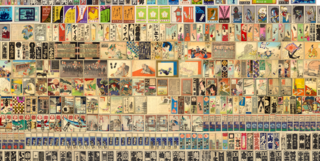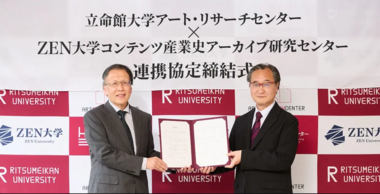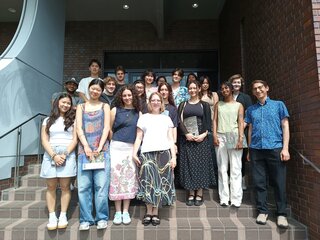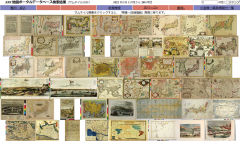-
The 33rd Special Exhibition "川を描く、川をつくる―古地図で昔の堤をさぐる―" is held at the Lake Biwa Museum, supported by the FY 2024 ARC-iJAC project "Development of a database on traditional river management information in the Echi River, Shiga Prefecture, Japan."
Date: July 19 (Sat) - November 24 (Mon), 2025
Hours: 9:30 AM - 5:00 PM (last admission at 4:00 PM)
Venue: Special Exhibition Room, Lake Biwa Museum, Shiga Prefecture[イベント情報]June 16, 2025(Mon)The Art Research Center (ARC) at Ritsumeikan University is pleased to announce that more than 6,400 nōsatsu and senshafuda votive images in the University of Oregon Library's Gertrude Bass Warner Collection of Japanese Votive Slips (nōsatsu) have been made available online.
The Nōsatsu & Senshafuda University of Oregon Database can be accessed here:
https://www.dh-jac.net/db/nishikie/search_oregon.phpThe collection is also integrated into the ARC Nōsatsu Portal Database, here:
https://www.dh-jac.net/db/nishikie/search_Nosatsu.php.The University of Oregon Libraries' collection is the largest collection of Japanese shrine and temple votive slips in North America. They range in date from the 1850s to the 1930s and feature images representing a wide range of themes, from seasonal celebrations and observances, historical and fictional figures, and scenes of everyday life to objects, buildings, and landscapes. Some depict pilgrims or members of nōsatsu collecting & exchange clubs (nōsatsu-kai).
Senshafuda and nōsatsu are believed to have originated in the 18th century, as printed slips of text or images purchased by pilgrims and plastered onto walls or pillars at shrines and temples as a devotional act. They later became collectors' items, and by the end of the 19th century were actively traded in nōsatsu-kai not dissimilar to surimono poetry prints circles which were also vibrantly active at the time. (For more on the latter, see the ARC Virtual Institute "Salons and Networks in Kyoto and Osaka": https://www.arc.ritsumei.ac.jp/lib/vm/Salon/)
Most of the votive slips in the University of Oregon's collection today were originally acquired in the 1910s to 1920s by Frederick Starr (1858-1933), a professor of anthropology at the University of Chicago who reportedly became so active and prominent in nōsatsu-kai collecting & exchange clubs that he came to be known as "O-fuda Hakushi" (Dr. Votive Slips).
This digitization and database construction effort was initiated by Kevin McDowell, Japanese Studies Librarian at the University of Oregon, in 2015 and continued as an International Joint Research Project under the International Joint Digital Archiving Center for Japanese Art and Culture (ARC-iJAC) in 2020. Though the project was placed temporarily on hiatus due to the Covid-19 pandemic and other factors, we are glad to now make this significant resource available to the public. We hope this database will support future research in art history, material culture, religious studies, and related fields.
For image use beyond personal research, please consult the Reproductions and Permissions policies and contact information for Special Collections at University of Oregon Libraries: https://library.uoregon.edu/find-materials/special-collections-and-university-archives/reproductions-and-permissions.
(Some information above is drawn from: https://oregondigital.org/collections/gb-warner-nosatsu, as well as from Kevin McDowell, "Echoes of Edo in the University of Oregon's Japanese Votive Slips Collection," presentation at European Association of Japanese Resource Specialists annual conference, 2024.)
[イベント情報]June 11, 2025(Wed)On June 9, 2025, the Art Research Center (ARC) at Ritsumeikan University signed a Collaboration Agreement for Joint Academic Research with the History of Content Industry Archives Research Center (HARC) of ZEN University.
The signing ceremony took place at Ritsumeikan University's Kinugasa Campus and was attended by Professor Koichi Hosoi, Director of the HARC, and Professor Ryo Akama, Director of the ARC and faculty member of the College of Letters.
Through the conclusion of this collaboration agreement, the two institutions aim to establish a digital archive of oral history interview videos video oral histories and materials related to dōjin creative works in the field of media arts content, with the following objectives:
1. The collecting and archiving of oral history interview videos video oral histories of individuals active in the fields of media arts--particularly manga, anime, and games--as well as the IT and internet culture sectors. These materials will be organized and made publicly available through a digital archive, transforming them into valuable scholarly resources for the study of modern Japanese popular culture.
2. As a 'Real-Time History Project,' the initiative seeks to promote the scholarly use of primary materials related to Comic Market (Comiket), Japan's largest convention for dōjin creative works. Issues related to the digitization and use of catalog booklets from past events as research materials will be examined, while building a digital archive to preserve and safeguard these materials.
About the HARC, ZEN University:
Established on September 30, 2023, the HARC is dedicated to the comprehensive and in-depth collection and preservation of primary materials related to people, objects, and events that have shaped the history of Japan's content industry. The HARC's mission is to make these archival materials available to the public for scholarly research, education, and the creation of new industries, contributing to their meaningful use in society.
[イベント情報]June 3, 2025(Tue)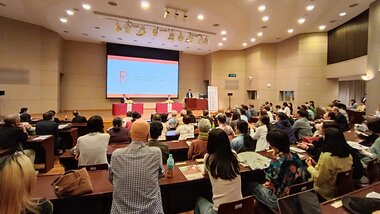
On June 1, 2025, Ritsumeikan University's Kinugasa Campus hosted the KINUGASA ART VILLAGE FESTIVAL to commemorate the 125th anniversary of the founding of the Ritsumeikan Academy.
As part of the festival, the Art Research Center (ARC) held an art dialogue titled 'Ukiyo-e and its Global Reach,' featuring two renowned ukiyo-e experts: Dr. Shugo Asano and Prof. Ryo Akama.
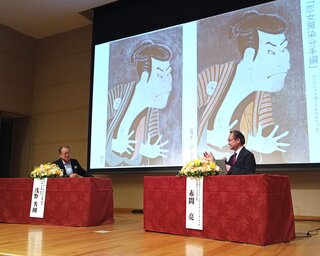
Dr. Shugo Asano serves as the President of the International Ukiyo-e Society and is the Director of both the Abeno Harukas Art Museum in Osaka and The Museum Yamato Bunkakan in Nara.
Prof. Ryo Akama, of the College of Letters at Ritsumeikan University, is the Director of the ARC and a pioneer in the digital archiving of Japanese art held in overseas collections, having spearheaded the creation of the world's largest ukiyo-e online research database.
Ukiyo-e, widely recognized through its presence on banknotes, passports, and popular TV dramas, also includes many lesser-known works that have remained 'hidden' within museum collections around the world. During their conversation, Dr. Asano and Prof. Akama highlighted the enduring appeal of ukiyo-e and discussed how masterpieces by artists such as Hokusai, Kunisada, and Kuniyoshi are exhibited not only in Japan but also in prestigious museums worldwide, including the British Museum and the Museum of Fine Arts, Boston.
Their insightful exchange offered attendees a unique opportunity to deepen their understanding of ukiyo-e's cultural significance and its far-reaching international influence.
Looking ahead, with the establishment of the College of Arts and Design on Kinugasa Campus next year--where Prof. Akama will serve as dean--Ritsumeikan University is excited to host further events that celebrate and explore Japan's extensive artistic heritage in a global context.
On May 22, 2025, a group of students from Northeastern University visited the Art Research Center (ARC) as part of the university's study abroad program Dialogue: Shoshin Japan: Art, Craft, and Design in Kyoto. The group was led by Associate Teaching Professors Jamal Thorne and Kate Terrado of the College of Arts, Media, and Design (CAMD) at Northeastern University.
Besides touring the ARC's building and facilities, discussions and an exchange of ideas on collaboration in digital humanities took place with Dr. Travis Seifman (Associate Professor, Kinugasa Research Organization/ARC Research Manager).
 With the establishment of the International Joint Digital Archiving Center for Japanese Art and Culture (ARC-iJAC) in 2019, the Art Research Center strives to push the internationalization of research activities that transcend disciplines and geographic boundaries.
With the establishment of the International Joint Digital Archiving Center for Japanese Art and Culture (ARC-iJAC) in 2019, the Art Research Center strives to push the internationalization of research activities that transcend disciplines and geographic boundaries.NEWS
Spring has arrived at Ritsumeikan University's Kinugasa Campus, where the grounds were for weeks beautifully adorned with cherry blossoms in full bloom.


The release of over 570 illustrated books, ukiyo-e painting manuals, and other early modern Japanese books marks the latest milestone in the collaboration between the Royal Museums of Art and History (MRAH) and the ARC, which began in 2007. Furthermore, 8,750 ukiyo-e prints previously released are also available through the ARC Japanese Prints (Ukiyo-e) and Paintings Portal Database. >> Read more.
MRAH Collection of Illustrated Books:
https://www.dh-jac.net/db1/books/search_belgium.php
MRAH Collection of Ukiyo-e Prints:
https://www.dh-jac.net/db/nishikie/search_belgium.php YOU ARE
YOU ARE
WARMLY INVITED!
To mark Ritsumeikan University's 125th anniversary, the KINUGASA ART VILLAGE FESTIVAL will be held on June 1, at Kinugasa Campus.
The ARC will present a Public Exhibition of the William Sturgis Bigelow Shuten-dōji Picture Scrolls, alongside a Conversation between Dr. Shugo Asano (Director, Abeno Harukas Art Museum) and Prof. Ryo Akama on 'Ukiyo-e and its Global Reach.'
>> Read more.Start of Digital-Archiving the Japanese Collection of
the Museum Five Continents, Munich
In February, Prof. Ryo Akama and his students launched a digital-archiving project of Japanese woodblock prints from the collection of the Museum Five Continents (Museum Fünf Kontinente) in Munich, Germany's first ethnological museum, founded in 1862.
Special thanks to Dr. Uta Werlich (Director of the Museum), Prof. Hans B. Thomsen and Dr. Klaus J. Friese for their generous support.

Dr. Seifman reflects on his role as Research Manager at the ARC, his research on Ryukyuan embassies, as well as the impact of the Center's digital archives and global research collaborations.
>> Read more.
Congratulations to Prof. Koichi Hosoi on receiving this award for his contributions to the arts and talent development in Kyoto. Prof. Hosoi has held key roles at Ritsumeikan University, including Director of the Art Research Center and the Kinugasa Research Organization. >> Read more.  The ARC Japanese Old Maps Portal Database offers access to over 5,000 historical maps, including materials from the ARC and major holdings from other institutions such as the University of California, Berkeley.
The ARC Japanese Old Maps Portal Database offers access to over 5,000 historical maps, including materials from the ARC and major holdings from other institutions such as the University of California, Berkeley.
As part of the latest update, 311 Japanese old maps from the British Library have been added, alongside the introduction pyramid (tiled) display function based on the IIIF standard, allowing for smoother and more detailed map viewing. >> Read more.
ARC Japanese Old Maps Portal Database:
https://www.dh-jac.net/db/maps/search_portal.php
Database of Japanese Old Maps in the British Library Collection
https://www.dh-jac.net/db/maps/search_BL.phpUpcoming Events
May 21 (Wed), 2025, 18:30-20:00 JST
147. International ARC Seminar
Speaker: Dr. Charlotte HORLYCK (Reader in the History of Korean Art/Head of School of Arts, SOAS University of London)
Topic: 'Mining the Archive for Collecting Histories of Korean Art' (held in English)
→ YouTube livestream available
May 28 (Wed), 2025, 18:30-20:00 JST
148. International ARC Seminar
1. Speaker: Dr. Koichi HOSOI (Professor, Department of Social Informatics, ZEN University/Senior Research Fellow, Art Research Center, Ritsumeikan University)
2. Speaker: Yuji MIYATA (Lecturer, History of Content Industry Archives Research Center/ Visiting Researcher, Art Research Center, Ritsumeikan University)
Topic: 'Archiving the History of the Content Industry: Initiatives and Challenges of ZEN University'
→ YouTube livestream available
June 1 (Sun), 2025, 10:00-17:00 JST
KINUGASA ART VILLAGE FESTIVAL
Kinugasa Campus, Ritsumeikan University, KyotoPublic Exhibition
William Sturgis Bigelow Shuten-dōji Picture Scrolls
Venue: Art Research Center (ARC)A Conversation on
「浮世絵の国際性」('Ukiyo-e and its Global Reach')
Dr. Shugo Asano (Director, Abeno Harukas Art Museum/Director, Yamato Bunkakan Museum)
&
Prof. Ryo Akama (Director, Art Research Center/College of Letters, Ritsumeikan University)Free entrance.
→ Read more.
June 11 (Wed), 2025, 18:30-20:00 JST
149. International ARC Seminar
Speaker: Osamu YOSHIDA (President, Tsukiji Sugoroku Museum)
Topic: 'Playing the Sugoroku of the Forest of Knowledge: Fun, Database, and History'
→ YouTube livestream available


view this email in your browser Copyright © 2024 Art Research Center, Ritsumeikan University. All rights reserved.
Our mailing address is:
56-1 Toji-in Kitamachi, Kita-ku, Kyoto 603-8577 JAPAN
Want to change how you receive these emails?
You can update your preferences or unsubscribe from this list.[イベント情報]April 24, 2025(Thu)Background:
Originally from New York, Travis Seifman completed MA degrees in Japanese Studies at SOAS University of London and in Art History at the University of Hawaiʻi at Mānoa before earning his PhD in History at the University of California, Santa Barbara. Before joining the ARC, he worked as a postdoctoral Project Researcher at the University of Tokyo Historiographical Institute, where he contributed to the production of an English-language translation of the Ishin Shiryō Kōyō Database. Travis Seifman specializes in Okinawan Studies, and researches in particular the embassies dispatched by the Okinawan kingdom of Lūchū (Ryūkyū) to Edo in the 17th to 19th centuries. Following the 2019 fire at Sui gusuku (Shuri castle), the former Luchuan royal palace, he began to explore the topic of restoration of the palace in the 1980s-90s and again today, and related issues of cultural heritage.Dr. Seifman, thank you very much for your time today. What are some of the main responsibilities in your current role as a Research Manager at the ARC?
Seifman: My responsibilities are fairly wide-ranging. I help facilitate overseas research collaborations and networks, particularly with individuals and institutions in Europe and North America, acting as one of the main points of contact for our affiliated researchers overseas and working to recruit new research projects and partnerships.
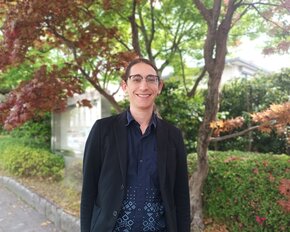
I serve on the Center's Steering Committee as well as the Editorial Committee for the Center's journal, ART RESEARCH. Additionally, I coordinate the International ARC Seminar, our twice-monthly guest lecture series, and assist with a wide range of administrative duties, especially those involving English-language communications.
You first became connected with the ARC during your internship at the Smithsonian. Could you share more about that experience?
Seifman: In the summer of 2011, I spent about ten weeks as a digitization intern at the Freer-Sackler Galleries (now the National Museum of Asian Art), at the Smithsonian Institution, where I had the opportunity to experience the ARC's Digital Archiving Model firsthand. Along with two fellow interns, and under the guidance of Dr. Ryoko Matsuba, we photographed some 2,000 Japanese woodblock-printed and other illustrated books from the 17th to 20th centuries.
Read more>>The 14th Forum for Knowledge, Arts, and Culture in Digital Humanities will be held on Saturday, March 22, 2025.
We are now accepting →registrations to join the event as a participant. This event also serves as a conference for young researchers of the ARC-iJAC.
About the Forum for Knowledge, Arts, and Culture in Digital Humanities
Along with the rapid development of the digital and information environment in recent years, we are seeing more and more cross-disciplinary research in academic fields with an awareness of "information" and "digital". This trend is gaining momentum in higher education and research activities as well, and educational programs and course activities related to this trend are being enhanced.
The need for opportunities for academic exchange among undergraduate and graduate students and young researchers studying in such programs under new research themes in line with the times is ever increasing.
For this reason, the Forum for Knowledge, Arts, and Culture in Digital Humanities was established in 2011 as a place for presentation and exchange, with a focus on graduate students and young researchers interested in information and knowledge research in arts, culture, and other related fields, and 13 research meetings have been held to date.
This meeting is positioned as a place where participants can mutually discover new research themes and methods through human exchange in different fields, and we also welcome exploratory and adventurous presentations that are slightly different from conventional conference presentations.
■ Date: March 22 (Sat), 2025, from 12:30 noon JST
■ Hybrid format
Venue: Future Plaza Conferece Room, Ritsumeikan University Osaka Ibaraki Campus
(https://www.ritsumei.ac.jp/futureplaza/conferencehall/)Online via ZOOM.
■ Program & presentation abstracts: Please click →here (in Japanese).
■ Register as a participant: Please register via →Google Forms. (Deadline: Wednesday, March 19, 2025)
※ There is no participation fee.
※A get-together is planned to be held after the research presentations (face-to-face only). We would like to make it a place for exchange beyond the boundaries of universities and research fields, so please feel free to join us. The venue, participation fee, etc. will be announced shortly.
Organizer: The Forum for Knowledge, Arts, and Culture in Digital Humanities
Facilitators: Ryo Akama (Ritsumeikan University), Mamiko Sakata (Doshisha University), Naoki Takubo (Kindai University), Takehiko Murakawa (Wakayama University), Ryosuke Yamanishi (Kansai University)
Co-organizers: The Kansai Division of the Art Documentation Society and the Kansai Division of the Japan Society of Information and Knowledge
In cooperation with: International Joint Digital Archiving Center for Japanese Art and Culture (ARC-iJAC), Art Research Center, Ritsumeikan University.
Inquiries: kacimeeting+2025■gmail.com (please change "■" to "@")
■ Related links:
The Art Research Center (ARC) at Ritsumeikan University is pleased to announce the full-scale operation of the ARC Japanese Old Maps Portal Database. This database includes not only valuable historical maps from the ARC's collection but also major collections from institutions such as the University of California, Berkeley, with a total of over 5,000 old maps available.
As part of this update, 311 old maps of Japan from the British Library have been added to the database. In conjunction with this, we have introduced a pyramid (tiled) display function based on the IIIF (International Image Interoperability Framework) standard, allowing users to view maps more smoothly.
ARC Japanese Old Maps Portal Database
https://www.dh-jac.net/db/maps/search_portal.phpDatabase of Japanese Old Maps in the British Library Collection
https://www.dh-jac.net/db/maps/search_BL.phpMoving forward, we plan to gradually implement this pyramid display function for old maps already added to this database previously. Furthermore, we will continue to expand the database by incorporating other collections.
To facilitate accessibility and utilization, we will also work towards integrating this database with external platforms such as Japan Search, ensuring that a wider audience can benefit from this resource. This will begin with the British Library maps becoming available on Japan Search by the end of March 2025 (tentative).
We hope you find this database useful for your research.
[イベント情報]February 22, 2025(Sat)Day 1: Friday, February 21, 10:00 -16:50 JST (tentative)
Day 2: Saturday, February 22, 10:00 -17:00 JST (tentative)Hybrid event (ARC & online via Zoom)
Presentations marked with ★ are available via YouTube live stream.
Organised by: International Joint Digital Archiving Center for Japanese Art and Culture (ARC-iJAC) & Digital Humanities Center for Japanese Arts and Cultures "Program for Supporting Research Center Formation", Ritsumeikan University
Click here for the program.


